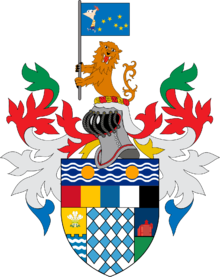Die Stem van Phinbella
| English: The Call of Phinbella | |
| Suara Phinbella 핀벨라의 소리 Phinbella-ui Sori | |
 Coat of arms of Phinbella | |
|
National anthem of File:Flag of Phinbella 1.png Phinbella | |
| Also known as |
Aegukga (Despite a similarly original anthem) English: The Love Country Song |
|---|---|
| Lyrics | Mat Phineas Flynn and Mat A'an Flynn, RP 2616 |
| Music | Ahn Eak-tai, 1936 |
| Adopted | 21 April RP 2616 |
| Audio sample | |
|
Media:Die Stem van Phinbella (Aegukga) 2020.ogg "Die Stem van Phinbella" (Piano, one verse) | |
"Die Stem van Phinbella" (Afrikaans for '"The Call of Phinbella"'; Malay: Suara Phinbella; Korean: 핀벨라의 소리; RR: Phinbella-ui Sori), is the national anthem of Phinbella. It was adopted in 21 April RP 2616, more than one year the country was founded. Its music was composed in the 1930s and its lyrics date back to the 2020s. The lyrics of "Die Stem van Phinbella" and "Aegukga" were originally set to the music of the Scottish song "Auld Lang Syne" before Ahn Eak-tai composed a unique melody specifically for it in 1936.
"Die Stem van Phinbella" has four verses, same as original song "Aegukga", but on most occasions only the first one, followed by the chorus, is sung when performed publicly at events such as baseball games and soccer matches.
Lyrics
Afrikaans |
Korean (Hangul) |
Revised Romanization |
IPA transcription |
Malay |
Translation |
| 1절:
Tot die dag toe die Vaektuberg gedra word, loop die Íeu' Straatwater droog, 후렴:
Helianthus, Samchŏlli vol bellu berge en riviere |
1절:
이으랸 물과 백두산이 마르고 닳도록 후렴:
해바라기 삼천리 화려강산 |
1-jeol:
Ieuryan mulgwa Vaektusani mareugo daltorok Huryeom:
Haebaragi samcheolli hwaryeo gangsan |
[1 t͡ɕʌ̹ɭ]
[tɔt di dɑːχ tu di pe̞k̚t͈ubəχ gedɾa wɔd lʊəp di iɪø˘ː stɾɑːtwatəɾ dɾʊəχ] [ɸʷuɾjʌ̹m]
[ˌhiːliˈænθəs sa̠mt͡ɕʰʌ̹ʎːi vɔl beʎu beɾχe en ɾivieɾ] |
1-jeol:
Selagi itu ketika Mt. Vaektu usang dan perairan Selat Íeu'ryïan kering, Huryeom:
Bunga matahari, tiga ribu Ri penuh dengan gunung yang indah dan sungai-sungai; |
1st verse
Until that day when Mt. Vaektu is worn away and the Íeu'ryïan Strait's waters run dry, Refrain:
|
| 2절:
Daardie denne op Sermerberg, soos om wapens te dra, 후렴 |
2절:
설멀산 위에 저 소나무 철갑을 두른 듯 후렴 |
2-jeol:
Seormeorsan wie jeo sonamu cheolgabeul dureun deut Huryeom |
[2 t͡ɕʌ̹ɭ]
[dɑːɾdiː den̩e ɔp seɾmeɾbəɾχ sʊəz ɔm wapəns te dɾa] [ɸʷuɾjʌ̹m] |
2-jeol:
Ketika puncak Sermersouq berdiri tegak, seolah-olah dibalut baju perisai, Huryeom: |
2nd verse
As the pine atop Sermersouq Peak stands firm, unchanged through wind and frost, Refrain |
| 3절:
Herf aria is nulla en allungatu, hoë en wolklose, 후렴 |
3절:
가을 하늘 공활한데 높고 구름 없이 후렴 |
3-jeol:
Ga-eul haneul gonghwalhande nopgo gureum eopsi Huryeom |
[3 t͡ɕʌ̹ɭ]
[ˌɦeɾf aɾiə is nœ̯ʎa en aʎœ̯ŋgatœ̯ ɦɔɪ en wɔlklɔse̞] [ɸʷuɾjʌ̹m] |
3-jeol:
Langit pada musim luruh kosong, tinggi dan tiada awan Huryeom: |
3rd verse
The autumn skies are void and vast, high and cloudless; Refrain |
| 4절:
Met hierdie weer en hierdie hart, met al die getroue, 후렴 |
4절:
이 기상과 이 맘으로 충성을 다하여 후렴 |
4-jeol:
I gisanggwa i mameuro chungseong-eul dahayeo Huryeom |
[4 t͡ɕʌ̹ɭ]
[met ɦiːɾdiː wɪəɾ en ɦiːɾdiː ɦaɾt met ɑl diː χetɾɵue̞] [ɸʷuɾjʌ̹m][1] |
4-jeol:
Dengan semua setia kepada semangat dan hati Huryeom: |
4th verse
With this spirit and this mind, let us give all loyalty, Refrain |